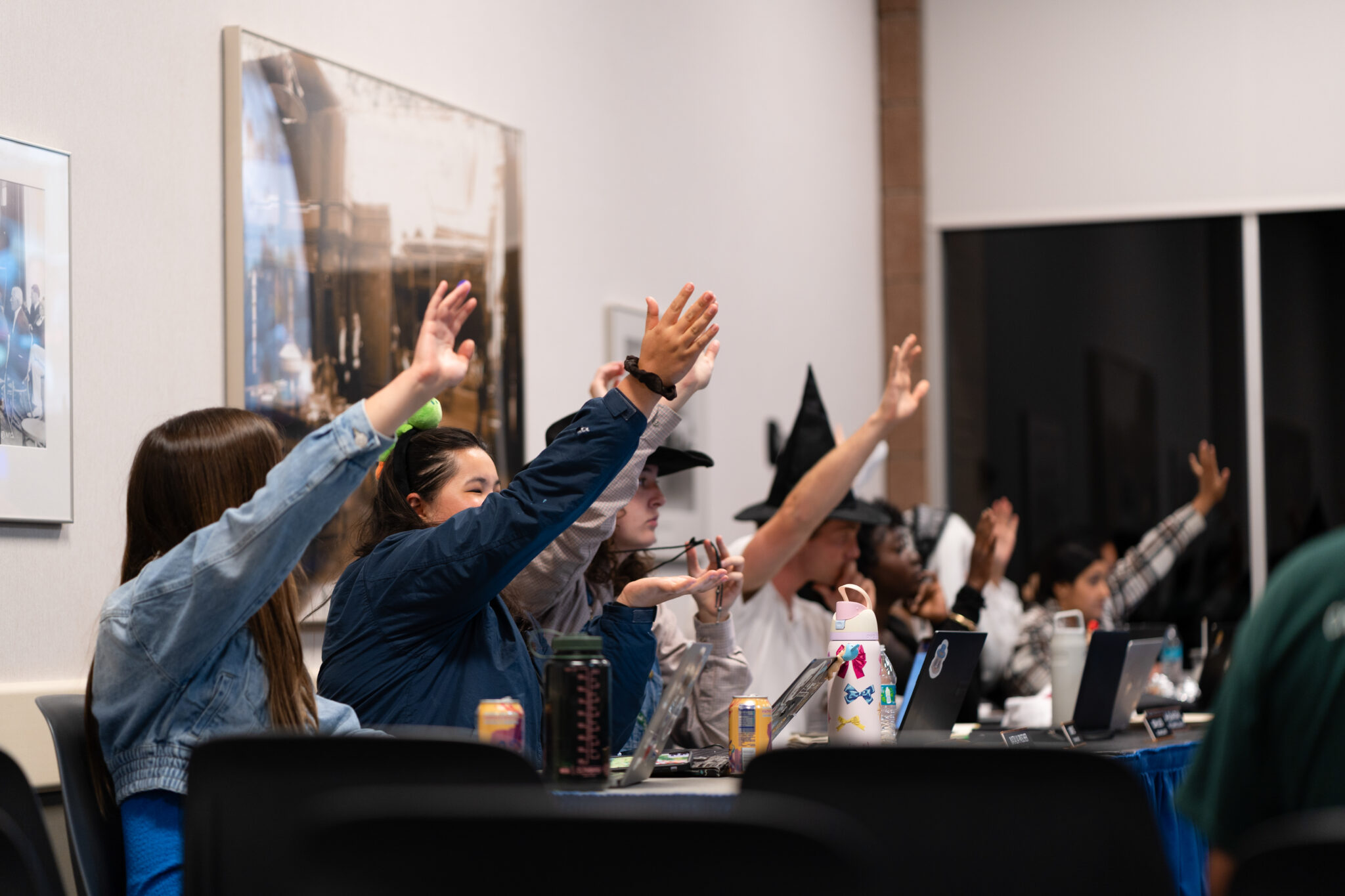The 76th Associated Students Senate passed $20,000 in funding to partially reinstate the UC Santa Barbara Library’s Late Night Study hours at its Oct. 29 meeting. The Senate also discussed additional programs for students losing Supplemental Nutrition Assistance Program benefits for November.

Senate votes to pass $20,000 in funding to expand Library Late Night Study hours. Shengyu Zhang / Daily Nexus
In September, the UCSB Library cut its hours of operation from being open 24/7 to closing from 1-8 a.m. This was the result of budget reductions due to state and federal budget cuts and rising operational costs across the University of California system.
After over a month of negotiations between Associated Students (A.S.) senators and executives with University departments, the library will open at 7 a.m. every day of the week, and Late Night Study hours have been extended from 1-3 a.m. from Sunday to Thursday.
During the meeting, the Senate approved the Memorandum of Understanding that extended library hours and allocated $20,000 from the A.S. Senate Unallocated Fund to partially pay for the costs of operation.
Following this, A.S. President and fourth-year global studies, communication and Spanish triple major Le Anh Metzger announced she is working on plans to address student food insecurity as it is uncertain if Supplemental Nutrition Assistance Program (S.N.A.P.) benefits will be distributed in November.
While President Donald Trump says he will withhold S.N.A.P. benefits until the government shutdown ends, he has the legal power to pay the benefits during the shutdown. Karoline Leavitt said the White House will comply with the orders to distribute the benefits, however this compliance remains uncertain.
According to Metzger, over 5,400 UCSB students receive S.N.A.P. benefits monthly and “there is not the money to provide them all with $3oo, but we can at least do something to address the issue in the interim,” Metzger said.
Metzger said she is working with the Basic Needs office to come up with ways to provide food for students, including conversations with local restaurants to potentially offer students free meals if they show their S.N.A.P. Electronic Benefits Transfer (EBT) card. In an association-wide email sent out Nov. 2, Metzger asked A.S. entities to contribute funding to the Basic Needs office for grocery vouchers.
Next, Senator and second-year political science major Erica Sherkin announced that the advocacy committee is planning a Thanksgiving food drive, as local food banks will be “slammed” that day. She also invited senators to bring non-perishable goods to the next senate meeting to contribute to the drive.
During unit reports, External Vice President for Local Affairs and third-year political science major E.J. Raad invited all senators to attend his “Save Deltopia” townhall on Nov. 12. The townhall is in response to the Isla Vista Foot Patrol’s proposed 72-hour noise ordinance on Deltopia weekend that would effectively cancel the unsanctioned street festival.
Senator and fourth-year political science major Natalia Pascher asked if the Senate should invite Santa Barbara City College students to fill the town hall. Raad agreed with the idea as he wants “as many people as possible.”
“I definitely do want it spilling out the door, and I don’t mind them being rowdy at all,” Raad said.
The Senate then passed A Resolution to Form the ASUCSB Executive Director Search Committee, which outlines the positions and responsibilities of the new search committee for the next A.S. Executive Director who manages the entire association.
Next, the Senate passed A Resolution to Establish the First-Gen and BIPOC [Black, Indigenous and people of color] Peer Mentor Advocacy Program (P-MAP), which would begin as a pilot program. Senators Eemaan Wahidullah, a third-year biology and political science double major, and Olabisi Ola-Olaitan, a fourth-year biology major, wanted to create a program that “increases participation in ASUCSB, and strengthens cultural, academic, and resource connections across campus.”
“We have the security to help manage and support alternative programs regardless of what happens in the future for other programs supporting marginalized students,” Wahidullah said.
The meeting ended by going into a closed session to discuss student fees. The Nexus was not able to confirm the details of the conversation.
A version of this article appeared on p. 6 of the Nov. 6 print edition of the Daily Nexus.




















